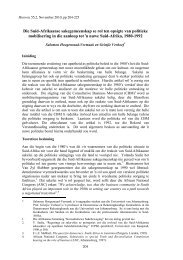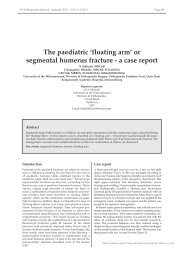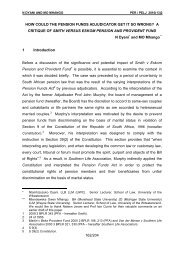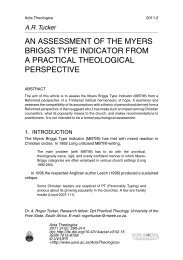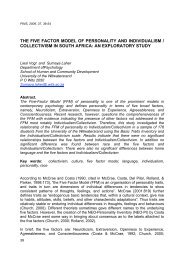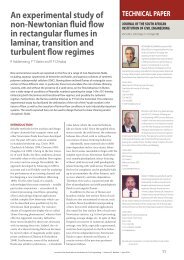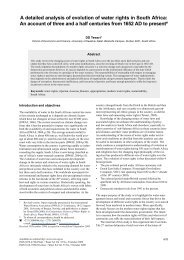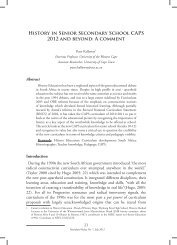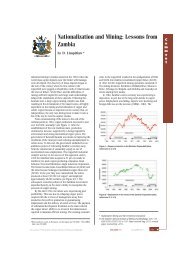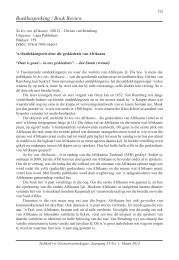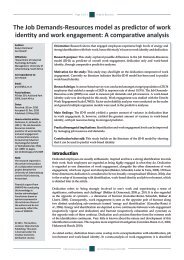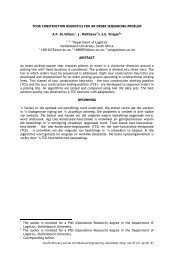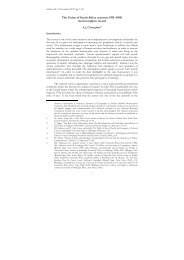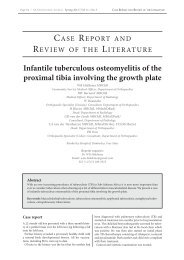91 Hendrik Verwoerd and the Leipzig School of Psychology in 1926 ...
91 Hendrik Verwoerd and the Leipzig School of Psychology in 1926 ...
91 Hendrik Verwoerd and the Leipzig School of Psychology in 1926 ...
You also want an ePaper? Increase the reach of your titles
YUMPU automatically turns print PDFs into web optimized ePapers that Google loves.
<strong>Hendrik</strong> <strong>Verwoerd</strong> <strong>and</strong> <strong>the</strong> <strong>Leipzig</strong> <strong>School</strong> <strong>of</strong> Pscyhology<br />
that, when <strong>the</strong> age <strong>of</strong> puberty arrives, <strong>the</strong>se faculties may be able to resist<br />
<strong>the</strong> degenerative <strong>and</strong> blight<strong>in</strong>g tendencies that must soon arise. 96<br />
Similarities with <strong>the</strong> Freudian concept <strong>of</strong> sublimation are obvious <strong>and</strong><br />
certa<strong>in</strong>ly no co<strong>in</strong>cidence. Europeans manage to sublimate <strong>the</strong>ir sexual<br />
drives <strong>and</strong> are able to redirect <strong>the</strong> energy towards <strong>in</strong>tellectual development<br />
<strong>and</strong> cultural progress. Africans, by contrast, are unable to do so <strong>and</strong> rema<strong>in</strong><br />
eternal children. For “primitive peoples”, puberty is a stage which is never<br />
overcome. It does not result <strong>in</strong> a new direction but <strong>in</strong> loss <strong>of</strong> orientation. This<br />
assumption was used to legitimise paternalism, segregation <strong>and</strong> corporal<br />
punishment.<br />
As far as we know from his papers, Volkelt did not pursue this racist<br />
variant but adhered closely to <strong>the</strong> <strong>the</strong>ory <strong>of</strong> civilisational development<br />
stages, which he tried to expla<strong>in</strong> through <strong>the</strong> tenets <strong>of</strong> developmental<br />
psychology. In <strong>Verwoerd</strong>’s case too, it is not clear whe<strong>the</strong>r he ever explicitly<br />
l<strong>in</strong>ked civilisational differences with popular racist <strong>the</strong>ories. Never<strong>the</strong>less, on<br />
numerous occasions <strong>in</strong> later years he spoke about various stages <strong>of</strong><br />
development, conclud<strong>in</strong>g that white people had a right <strong>of</strong> trusteeship over<br />
<strong>in</strong>digenous Africans. He ma<strong>in</strong>ta<strong>in</strong>ed that Africans had migrated <strong>in</strong>to South<br />
Africa at about <strong>the</strong> same time as <strong>the</strong> first Europeans had arrived, but <strong>the</strong>y<br />
had used <strong>the</strong>ir opportunities much less efficiently <strong>and</strong> were unable to<br />
catalyse cumulative civilisational growth. 97 It seems quite reasonable to<br />
assume that <strong>the</strong>se explanations drew on ethnopsychological <strong>the</strong>ses that he<br />
was exposed to while <strong>in</strong> <strong>Leipzig</strong>. Many years later he answered L.J. du<br />
Plessis’s criticism <strong>of</strong> his apar<strong>the</strong>id policy, by say<strong>in</strong>g that <strong>the</strong> “pace <strong>of</strong><br />
development is not so much determ<strong>in</strong>ed by external factors but ra<strong>the</strong>r by<br />
psychological susceptibility <strong>in</strong> various stages.” 98<br />
The racist component <strong>in</strong> <strong>the</strong> sense <strong>of</strong> deny<strong>in</strong>g an African ability to<br />
develop ow<strong>in</strong>g to biological factors is not clearly discernible. Never<strong>the</strong>less,<br />
<strong>Verwoerd</strong> must have been familiar with popular “<strong>the</strong>ories” that blamed <strong>the</strong><br />
libido for <strong>the</strong> <strong>in</strong>ability <strong>of</strong> African civilisations to develop, but he was cautious<br />
enough to never refer to <strong>the</strong>m <strong>in</strong> public.<br />
96. D. Kidd, Savage Childhood: A Study <strong>of</strong> Kaffir Children (Black, London, 1906), pp<br />
viiif. Volkelt apparently knew Kidd’s book. On <strong>the</strong> “<strong>the</strong>ory” <strong>of</strong> arrested development<br />
<strong>and</strong> with reference to Kidd, see S. Dubow, Scientific Racism <strong>in</strong> Modern South<br />
Africa (Cambridge University Press, Cambridge, 1995), pp 197ff. See also C.<br />
Marx, “Folter und Rassismus. Südafrika während der Apar<strong>the</strong>id”, <strong>in</strong> P. Burschel, G.<br />
Distelrath <strong>and</strong> S. Lembke (eds), Das Quälen des Körpers. E<strong>in</strong>e historische<br />
Anthropologie der Folter (Böhlau, Köln <strong>and</strong> Wien, 2000), pp 257–279, especially<br />
pp 274ff.<br />
97. For <strong>in</strong>stance, <strong>in</strong> his speech before <strong>the</strong> South Africa Club <strong>in</strong> London on 3. March<br />
1961 after South Africa had left <strong>the</strong> Commonwealth, see A.N. Pelzer (ed.),<br />
<strong>Verwoerd</strong> aan die Woord (Afrikaanse Pers, Johannesburg, 1963) p 474f.<br />
98. Quoted <strong>in</strong> Scholtz, <strong>Verwoerd</strong>, vol.1, p 299. Translated from <strong>the</strong> orig<strong>in</strong>al Afrikaans.<br />
116



